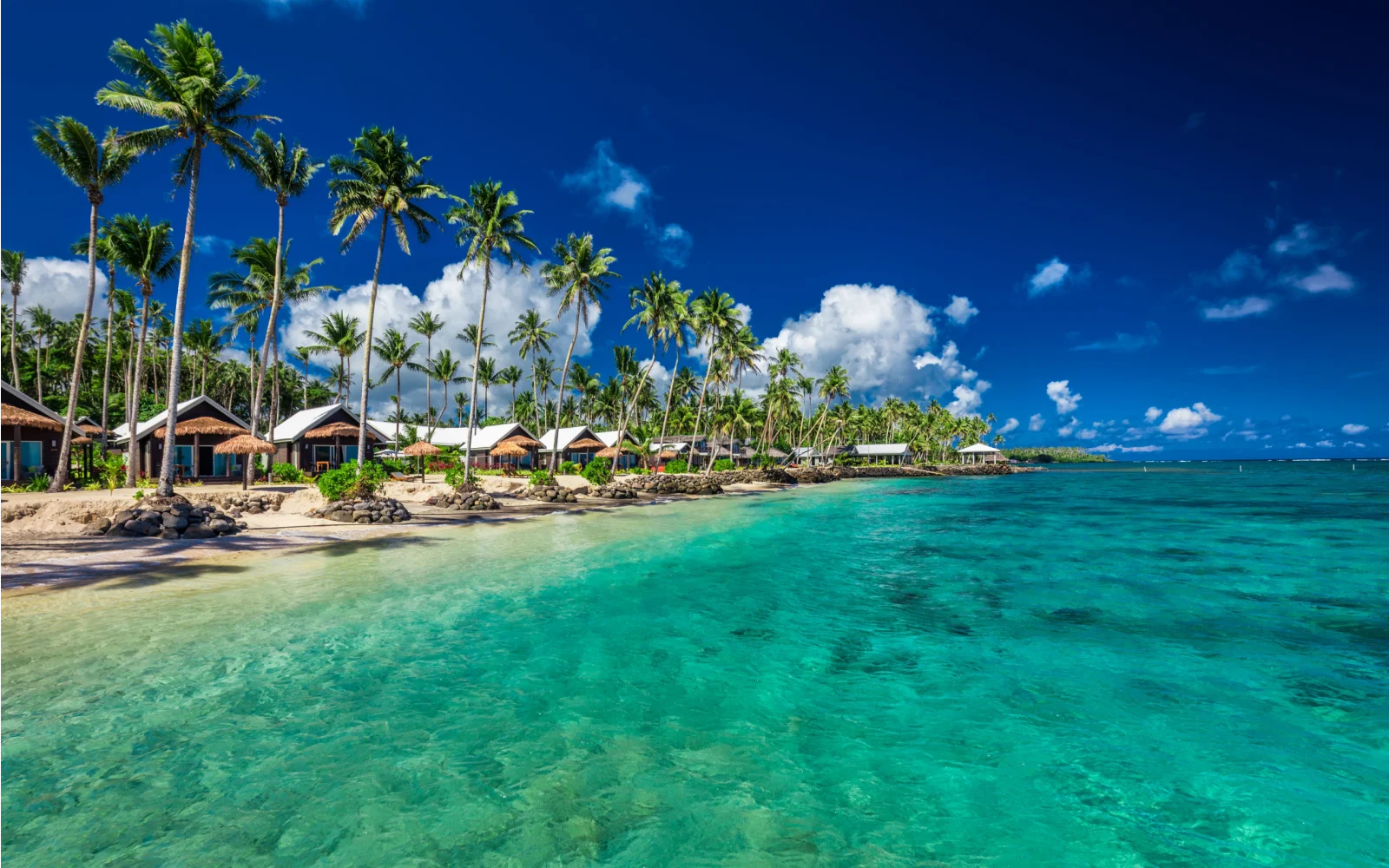For many people, Samoa is a tropical paradise on Earth. With its white-sand beaches, crystal-clear waters, and lush rainforests, it’s no wonder that thousands of international visitors make the trek to this remote island nation in Polynesia each year.
Most people come to Samoa for the classic tropical vacation experience: to relax on pristine beaches, swim in turquoise waters, and explore lush rainforests. But Samoa is more than just a beautiful place to unwind. It’s also a country with a rich history, culture, and friendly people.
But while Samoa is a desirable vacation destination, is it safe to visit? Here’s our take.
Is Samoa Safe to Visit in 2025?
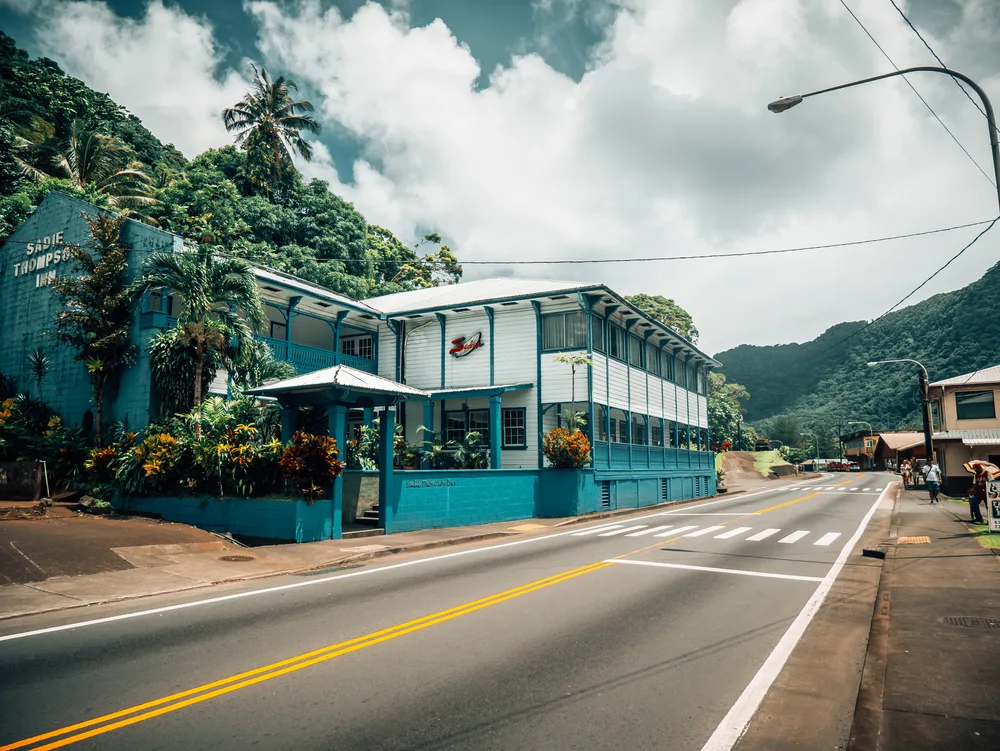
Pago Pago, Tutuila /American Samoa – February 15th 2019: Main Street in Pago Pago, American Samoa/Iryna Makukha/Shutterstock
Samoa is a very safe place to visit, and you shouldn’t experience any trouble when you go there! The crime rate is low on the island, although property crime does happen, and the rates of some crimes are increasing.
You also need to beware of storm season, just as when you visit any tropical destination, but with the right precautions, you can have a great time on your trip.
To get an idea of how safe Samoa is, all you need to do is look at travel advisories. Even countries that normally are wary in their travel advisories are calm about their citizens traveling to Samoa.
The United States has Samoa under a Level One travel advisory, just advising citizens to take normal precautions. The New Zealand government doesn’t even issue a specific travel advisory for Samoa.
Most countries agree that Samoa is a very safe place to visit, but some offer more details about any hardships their citizens might encounter while on vacation.
Potential problems include:
- Break-ins
- Pickpocketing
- Purse-snatching
- Sexual harassment
- Assault
Samoa does have problems, just like any other place in the world. However, the rates at which these crimes occur are very low. Violent crime rates are particularly low.
There are other factors potentially affecting your safety in Samoa. One important variable is the weather. Tropical destinations such as Samoa are known not only for their warm climates but also for their vulnerability to violent storms.
In the Pacific Ocean, these tropical storms are called cyclones. Luckily, Samoa is usually only affected by cyclone foothills, not directly by the worst of the storm.
Cyclone season is before and after the monsoon season, so May–June and October–November are not the best months to travel to Samoa. Most tourists come to Samoa to explore the beautiful beaches and enjoy water sports, but you should be careful when you do so.
Only swim in safe areas, so ask tour operators or your accommodation hosts about the best beaches. Avoid swimming during high-risk times, such as when the tide goes out.
Strong currents and riptides have drowned people in the past. Overall, you will need to take a few precautions in Samoa, but not many.
Crime in Samoa
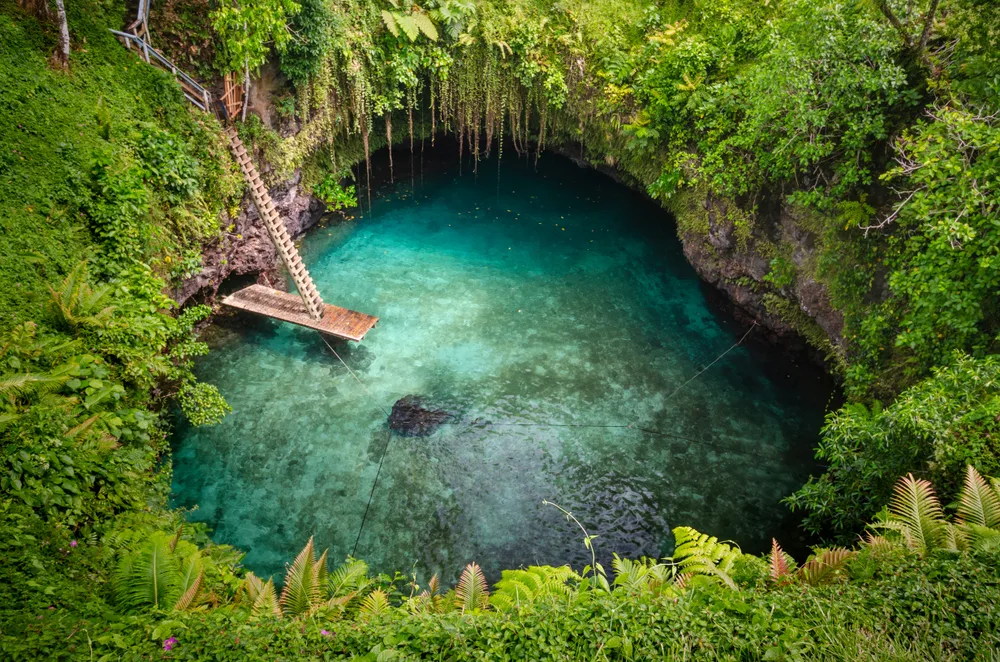
Martin Vinas/Shutterstock
Crime rates in Samoa are mostly low, but like anywhere else, crime does occur. Beneath the pictures of an island paradise, there are plenty of societal problems, just as there are in other countries.
Due to Samoa’s small population, crime rates are sometimes deceptive. Crime rates are usually calculated at a rate of incidents per 100,000 people, and Samoa has just over 200,000 people.
That means that every incident seems magnified. For example, the homicide rate in 2018 was 6.63 incidents per 100,000 people, compared to just 3.58 the year before.
In reality, that just means there were a handful of homicides in the entire island country, but the rate looks bad. When violent incidents do occur in Samoa, they usually affect locals, not visitors, and arise as a result of disputes.
There have been high-profile incidents, such as the 2016 case when an Australian couple was attacked while on vacation, and the woman was sexually assaulted. However, this incident made headlines due to its rarity and because the perpetrator was a prison escapee.
Samoans and ex-pats are much more worried about property crime. According to Numbeo, Samoa scores 41.07 out of 100 on the crime index, which is a moderate value. The most common crimes are vandalism, theft, and muggings.
Nonviolent property crimes are the most common incidents.
Overall, violent crime on the island is low, so low that even the few professional criminals involved in the drug trade are known for their nonviolent methods, according to the Global Organized Crime Index.
There have been reports about crime increases over the past few years, but dig below the headlines, and the situation in Samoa is not as scary as it seems.
First, the crime surge was driven by higher reports of domestic violence, a tragic crime but one that won’t affect tourists. Other crimes that increased were petty property crimes, which are unpleasant but unlikely to leave long-term effects.
Samoa is a small, close-knit society where the authority of tribal chiefs is still held in high regard.
Their often strict rulings are rarely defied, which is part of the reason why crime is so rare on the island. The justice system is also strict and efficient, acting as a deterrent for potential criminals.
Petty Theft
The most common crime affecting tourists in Samoa is petty theft. This is normal in most tourist destinations, where there will always be some unethical people looking to take advantage of the relative lack of street smarts that foreigners may have.
It’s especially common in places where there is a big gap between the income of locals and visitors, which is usually the case for Samoa.
The Canadian government includes a short description of common crimes in its Samoa travel advisory. Petty crimes are the most common, such as pickpocketing and purse snatching.
Although the capital Apia is the most common location for petty theft, just because it has the most people, incidents can occur anywhere in Samoa. The UK government offers advice on how to prevent being the victim of a crime.
Make sure that you never leave your valuables unattended. Even a few moments of inattention are enough to make you regret it later, so always keep a firm grasp on your phone, wallet, and ID.
Thieves will sometimes rifle through people’s possessions left unattended at the beach, so don’t take your valuables with you when you go swimming. The most common advice to prevent theft tells you to leave your valuables at your accommodations, but break-ins are increasing.
These break-ins often target tourist accommodations such as hotels, resorts, and rental homes. When you’re booking your accommodations, research the security precautions, and if you can’t find any information, ask.
Most good hotels and resorts have a hotel safe for you to store your valuables, potentially a room safe, and 24/7 security. Places with these precautions rarely experience break-ins.
Assault
Although violent crime is rare in Samoa, there have been incidents in the past of tourists getting assaulted. Some residential break-ins turn violent and escalate into cases of assault.
If you stay in a place with a good safety reputation and precautions such as the ones we mentioned above, that is usually enough to deter potential thieves. Some assaults occur when you are out and about.
The Australian government includes warnings about the risk of violent assault, sexual assault, and robbery while in Samoa. Although the rate of all of these crimes is very low, they can still happen, and criminals are beginning to attack tourists more and more.
Most of these incidents tend to occur at night, so a very easy precaution to avoid these problems is to avoid going out alone at night. They are mostly concentrated in Apia, although there have been violent attacks in more isolated areas in the past.
Any section on assault in Samoa has to mention the risk of gender-based violence, including sexual assault. Samoa is a very conservative society, including when it comes to gender roles.
While this patriarchal society primarily affects local women, it can affect foreign travelers as well. The Canadian government warns female travelers that harassment, particularly catcalling, often follows solo female travelers and that there have been cases of sexual assault.
Women traveling alone should particularly be careful about walking alone at night, as that is when most assaults occur.
Avoiding Bad Areas
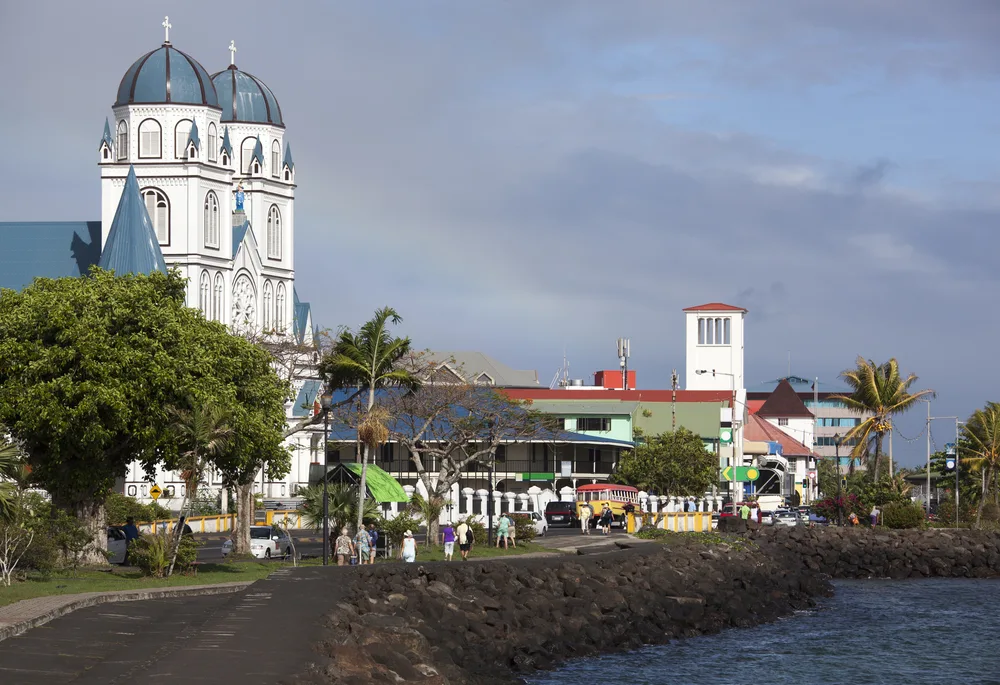
Ramunas Bruzas/Shutterstock
While most of Samoa is very safe, there are a few places where you should be careful. In the capital Apia, avoid walking along the sea wall by the harbor front. This area is where most muggings and robberies occur, especially at night.
You should also be careful near the downtown stretch of bars near Beach Road, particularly if you are a woman. The crowds here tend to be highly inebriated, and verbal harassment, fights, and even assault can occur.
Elsewhere in Samoa, be careful when going to remote beaches. Not only do criminals sometimes lurk on beaches to rob unsuspecting tourists, but the swimming conditions can also be dangerous. Always ask locals for advice on which beaches to go to.
Things to Consider
Here are a few additional safety tips for Samoa:
- Samoa is a conservative, Christian society. On Sundays, most of the population goes to church, most businesses are closed, and the sale of alcohol is illegal. Respect local norms by dressing modestly when not at the beach, not overindulging in alcohol, and not insulting the religion. Homosexuality is still illegal and frowned upon, which might affect LGBT travelers.
- There are a lot of stray dogs in Samoa, most of whom are harmless, but some of them can be very territorial. Try not to get too close to them, and definitely don’t try to pet the dogs, as some of them are dangerous.
- Samoa suffered a measles outbreak in 2019, in part due to low vaccination rates. While the outbreak has since been confined, there is a possibility of another epidemic of a communicable disease while you are in Samoa. Make sure that your vaccinations are up-to-date.
- Road conditions in Samoa are poor outside of the main islands, and many people drive without a license. Be careful when crossing the street. Avoid driving or taking transportation at night unless necessary due to poor visibility.
Frequently Asked Questions
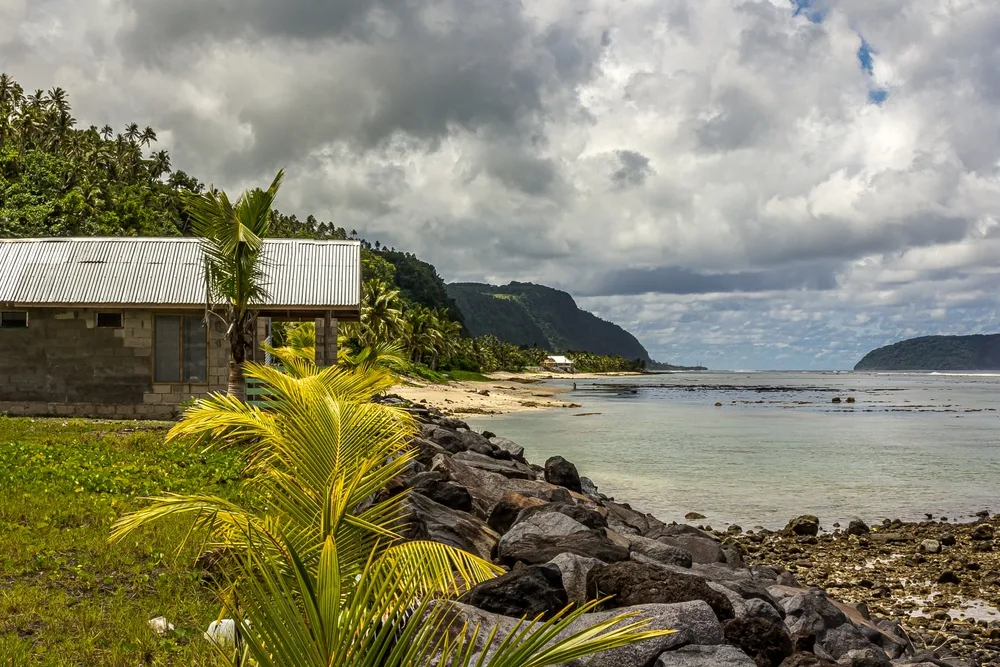
Dmitrii Kash/Shutterstock
Here are a few other questions people want answered before visiting Samoa:
Is Samoa safe for females?
Samoa is generally safe for female travelers. However, women should take extra precautions in terms of booking secure accommodations and not walking in unfamiliar areas at night — the same way they have to elsewhere. Plus, female travelers should prepare for the conservative culture in Samoa.
Is traveling to Samoa expensive?
Getting to Samoa might be expensive, depending on where you are coming from. However, once you reach the island, it is one of the more affordable South Pacific destinations, and it is easy enough to travel on a budget.
Do they speak English in Samoa?
Most people in Samoa speak English, especially those who work in tourism. English is also one of the official languages, along with Samoan.
Is alcohol legal in Samoa?
Alcohol is legal in Samoa, but it probably faces more restrictions than it does in your home country. The legal drinking age is 21—not 18 as it is in most countries. The sale of alcohol is banned on Sundays and religious holidays.
Is Samoa rich or poor?
Samoa is a low to middle-income country. Most people are dependent on tourism, fishing, or remittances from family members abroad for their income. There is a big income gap between locals and visitors, which contributes to petty crime.
So, Is Samoa Safe to Visit?
For the most part, Samoa is truly the tropical paradise it appears to be in photographs. Although you have to take some precautions against petty crime, most vacations to Samoa are perfectly safe. So what are you waiting for — book your trip today!



